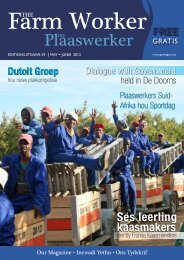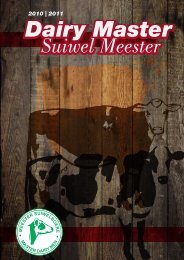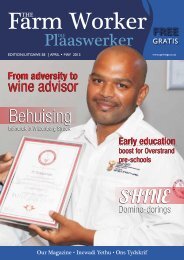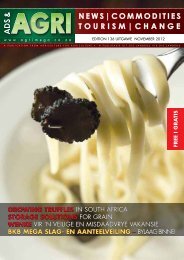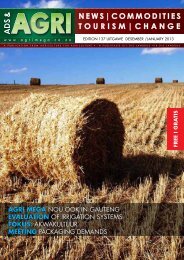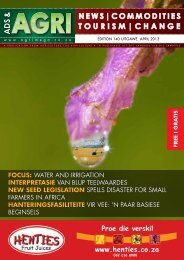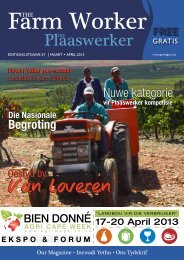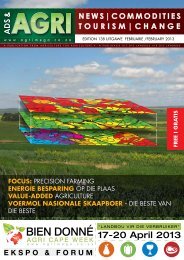Bien Donné Farm - Agri Promo
Bien Donné Farm - Agri Promo
Bien Donné Farm - Agri Promo
Create successful ePaper yourself
Turn your PDF publications into a flip-book with our unique Google optimized e-Paper software.
How do we go about<br />
creating a thriving greenhouse<br />
industry in South Africa?<br />
Leensie Streicher<br />
AMG Media &<br />
<strong>Promo</strong>tions<br />
S<br />
outh-Africa has a 34 year history of greenhouse<br />
crop production in South Africa. Initially<br />
growers and Stellenbosch University<br />
(Professors Laubscher and Maree) worked together,<br />
researching problems and developing solutions for<br />
the greenhouse industry. However, research in this<br />
industry have been hampered by lack of funding as<br />
no statutory levy is placed on the sales of vegetables<br />
and researchers receive very limited funding from the<br />
private or public sectors.<br />
Dr. Petrus Langenhoven of ASNAPP (<strong>Agri</strong>business<br />
in sustainable natural African plant products) said at<br />
the 2011 <strong>Bien</strong> <strong>Donné</strong> <strong>Agri</strong> Cape Week, that IASA presented<br />
many symposia and workshops in the past<br />
to disseminate information that has been developed<br />
in South Africa and abroad. With limited funding local<br />
researchers and researchers from abroad made<br />
BIEN DONNÉ AGRI CAPE WEEK 2012<br />
exchange visits.<br />
“In the past several attempts were made by IASA to<br />
support institutions of higher learning. However, funding<br />
was always limited and therefore did not contribute<br />
considerably to research and training”.<br />
Langenhoven furthermore said that the industry is<br />
fragmented. “Grower associations using similar technology<br />
to produce vegetables, flowers and seedlings<br />
are not working together.”<br />
According to him Stellenbosch University has the<br />
strongest under and postgraduate academic program<br />
in greenhouse crop production, but even with<br />
their contribution, very few young agronomists are<br />
being trained and the average age of growers are increasing.<br />
There are also many young inexperienced<br />
growers, very limited research and the development<br />
of local solutions (technology) is limited.<br />
All is not lost though and Langenhoven also suggested<br />
actions that could help to create a thriving<br />
greenhouse industry in South Africa. He suggested<br />
the following:<br />
• Multi-disciplinary process involving many<br />
actors;<br />
• Market first, science-based agribusiness<br />
development approach;<br />
• Creating networking platforms to bring<br />
businesses together;<br />
• Value Chain Approach;<br />
• Creating strategic partnerships;<br />
• Public-private partnerships, e.g. ARC,<br />
NDA, DTI;<br />
• Private sector relationships;<br />
Sustainable greenhouse production<br />
in South Africa means that production<br />
must double, whilst leaving only half the<br />
ecological footprint by reducing environmental<br />
degradation and optimising the<br />
efficiency of inputs (energy, water, minerals,<br />
crop protection) within economic<br />
constraints (profitability). New techniques<br />
and concepts should also be explored<br />
and adopted.<br />
As a way forward, engagement with<br />
growers should be continued and student<br />
training must be supported more.<br />
Producers should create partnerships<br />
and work together in ensuring quality extension<br />
services.<br />
20 www.agrimega.co.za



